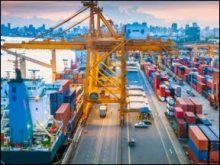 With cargo at Indian ports witnessing Y-o-Y decline of nine per cent each in July and August, after severe contraction of ~22% in Q1 FY2021 due to the impact of Covid-19 pandemic, the Indian Port sector is witnessing deceleration in cargo decline in Q2 FY2021. The recovery has been relatively better at non major ports. The recovery trend is driven by easing of containment measures and uptick in economic activity. The major cargo segments impacted are POL, coal and containers; while fertilizers and iron ore have bucked the trend. Regarding the developments, Sai Krishna, Assistant Vice President and Associate-Head, Corporate Ratings, ICRA says, “The deceleration in cargo contraction is a favourable trend, but recovery in certain segments like POL, which was expected to be faster with easing of lockdown, has not materialized in line with expectation due to continued subdued demand. Further, the recovery in segments like coking coal and containers may be prolonged compared to other segments. Also, the recovery trend in certain segments like thermal coal has been volatile at non-major ports. Hence, the sustainability of recovery trend remains a concern at present and the sector is not out of the woods. ICRA reiterates its expectation that while general cargo throughput may witness ~6-8% contraction for full year 2020-21, the container segment may witness a decline of 12-15% during the same period.”
With cargo at Indian ports witnessing Y-o-Y decline of nine per cent each in July and August, after severe contraction of ~22% in Q1 FY2021 due to the impact of Covid-19 pandemic, the Indian Port sector is witnessing deceleration in cargo decline in Q2 FY2021. The recovery has been relatively better at non major ports. The recovery trend is driven by easing of containment measures and uptick in economic activity. The major cargo segments impacted are POL, coal and containers; while fertilizers and iron ore have bucked the trend. Regarding the developments, Sai Krishna, Assistant Vice President and Associate-Head, Corporate Ratings, ICRA says, “The deceleration in cargo contraction is a favourable trend, but recovery in certain segments like POL, which was expected to be faster with easing of lockdown, has not materialized in line with expectation due to continued subdued demand. Further, the recovery in segments like coking coal and containers may be prolonged compared to other segments. Also, the recovery trend in certain segments like thermal coal has been volatile at non-major ports. Hence, the sustainability of recovery trend remains a concern at present and the sector is not out of the woods. ICRA reiterates its expectation that while general cargo throughput may witness ~6-8% contraction for full year 2020-21, the container segment may witness a decline of 12-15% during the same period.”
While, the cargo performance has been subdued, there has been traction on reform front with passage of Major Port Bill 2020 in September 2020, after witnessing long delays since its initial introduction in 2016. Commenting on the same, K. Ravichandran, Senior Vice President and Group Head, Corporate Ratings, ICRA adds: “The passage of the bill is a positive for the port sector, with increased flexibility for major ports with regards to tariff setting, port infrastructure development and financial decisions. This should aid the major ports in being more competitive and nimble in the market vis-a-vis non-major ports and also boost their ability to attract more private sector investments in the medium to long term.
However, the legacy tariff disputes with various BOT players remain an overhang. The recent launch of SAROD-Ports for alternative dispute resolution and the proposed constitution of Adjudicatory Board, under the new Act, provide some new avenues for dispute resolution compared to extended and costly litigation and arbitration process. The early resolution of the long pending disputes should help in unleashing the benefit of reforms and remains a sensitivity factor.”
 Cargo Breaking News
Cargo Breaking News


